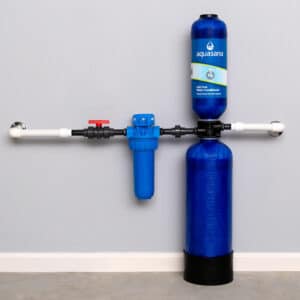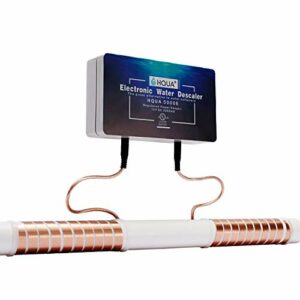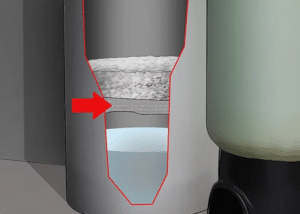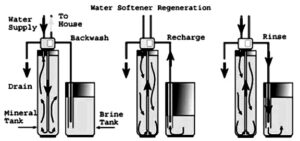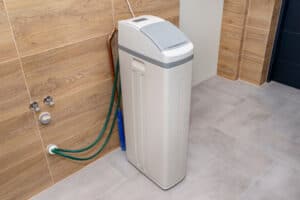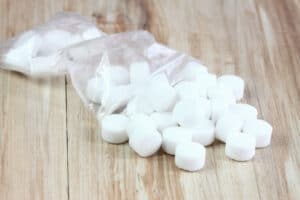A whole house water softener system is the ultimate solution to hard water problems. Not only will this device enhance the taste and softness of your water, they will also save you time and money.
After evaluating numerous water softener systems, we determined the best water softener to be the SpringWell FutureSoft® Softener, a salt free system that will prevent hard water minerals from clogging your pipes and appliances. Fleck 5600SXT is also a worthy salt-based softener to consider.
Whole House Water Softener Comparison Table
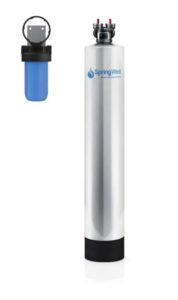
- Water Flow Rate: 12 gpm
- Tank Width: 6″
- Warranty: Lifetime
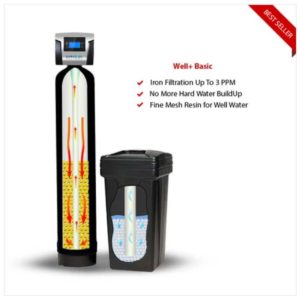
- Water Flow Rate: 6-7 gpm
- Tank Width: 9″
- Warranty: Lifetime
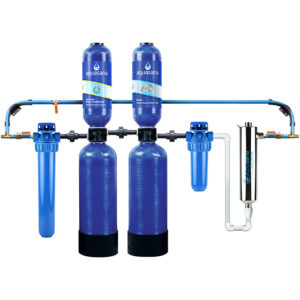
- Water Flow Rate: 7 gpm
- System Width: 69″
- Warranty: 5 Years
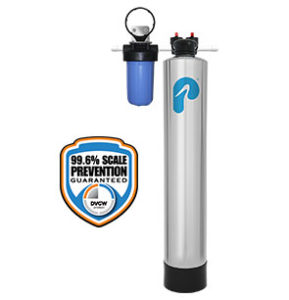
- Water Flow Rate: 10 gpm
- Tank Width: 9″
- Warranty: Lifetime
Criteria For Choosing a Water Softener
Finding a quality softener is no simple task. Between regeneration capacities, flow rates, and plumbing fixtures—it can be hard to see through the fog and find the best product for your needs.
To simplify the process, we put together the following list of tips and takeaways:
- Always trust a plumbing professional if you are uncomfortable installing fixtures and adapters
- If convenience is very important to you, consider buying a salt-free softener
- For speedy pours, look for brands that offer 4 GPM or higher
- For larger families, grain capacities of 64,000 or higher are ideal
- Seek out trusted brands like SpringWell, Fleck, US Water Systems and Aquasana
Best Water Softener Reviews – For City & Well Water
Here are our top picks for whole house water softeners:
- SpringWell FutureSoft®
- Fleck 5600 SXT
- US Water Systems Matrixx
- Quality Water Treatment SoftPRO Elite
- Aquasana Whole House Water Softener
- Pelican NaturSoft®
- Eddy Electronic ED6002P
1. SpringWell FutureSoft® Water Softener – Best Buy For The Money
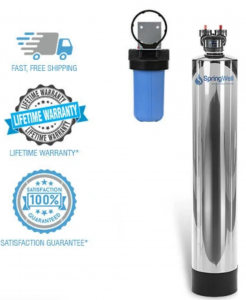
The highly-rated SpringWell FutureSoft® Water Softener features proprietary media, setting it apart from other salt free water softener systems on the market today. Unlike salt-based water softeners that typically use ion exchange to remove hard water minerals, salt free uses Template Assisted Crystallization (TAC) that converts the minerals to a hard crystal that won’t stick to your home’s surfaces. In addition, they don’t “soften” the water; they condition (or neutralize) it.
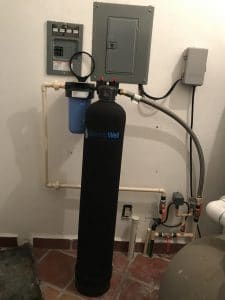
Over 30 years of experience and thorough testing led SpringWell to design a tank that fluidizes the media bed better than other designs on the market. Through the “secret” of low to high flow rates, the FutureSoft® media converts the water’s hardness into calcite crystals that won’t stick to anything. Installing this chemical-free system will eliminate scale, extend the life of your faucets and appliances, and even improve your nail and hair health.
The system itself is installed on your main water line, and once it is connected, it starts crystalizing hard water minerals and cleaning existing scale build-up in your pipes and plumbing. Even better, you don’t need electricity or a drain with this system. Plus, it never needs replacing, and all parts come with a lifetime guarantee. This system comes in three different units and ranges in water pressure of 12 to 20 GPM, far above its competitors.
Because the SpringWell FutureSoft® Softener is extremely high quality, it comes with a higher cost. However, you won’t be using electricity, and the company provides a lifetime warranty on all parts, which means, in the long run, you will be saving money. SpringWell is a powerhouse in the water softening market, which is why we recommend this system.
Review: Springwell FutureSoft Water Softener
- Great for City and Well Water
- Prevents and cleans existing scale
- Gives your appliances a longer life
- No electricity needed
- Six-month satisfaction guarantee
- Lifetime warranty on all parts
- High price tag
- Bottle is heavy compared to metal or plastic
2. Fleck 5600SXT – Best Salt-Based Softener
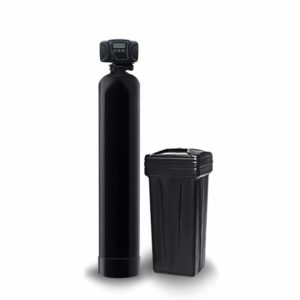
If you don’t like Salt-free softeners , have a look at Fleck 5600SXT salt-based water softener. Although our top pick (SpringWell Futuresoft®) also has a salt-based version (see it here) , the Fleck 5600SXT is also an excellent product that will get the job done.
Featuring an upgraded digital design, this Fleck water softener displays the flow rate and hardness levels on an LED display for your convenience. But don’t worry, you will not have to make manual adjustments—all settings are automated with the 5600SXT. That’s one of the pros of an effective intelligently designed filter, where maintenance considerations are designed into the system to help you reduce your house chores.
There is a lot to love about the 5600SXT, especially its easy setup. Almost everything needed to install and operate this water softener is found right in the box, including the tank, control head, brine tank, and resin. To get the device running, simply plumb it to your water supply (1-2 hour project with basic plumbing skills) and add salt.
Despite its small form factor and lightweight build (only 20.8 pounds, which includes the resin), the 5600SXT is one of the best salt-based water softener devices at its size. Running on 120 volts, you never have to worry about this device racking up your energy bills or taking up too much space in your house. Measuring 54 inches in height, you can slot this water softener filter to your water supply without obstructing any equipment.
One of our favorite aspects of this Fleck salt-based water softener is that it comes with an extended 5-year warranty on all system parts. We rate that as a big plus for this softener in our book.
With nearly three decades in the industry, there are plenty of reasons to trust the experts at Fleck to soften your water and make it taste clean and clear as it should. Your skin, hair, and family will thank you.
- Digital, “on-demand” control valve
- 48-hour internal power backup
- Quick, two-hour installation
- Automatic, meter-based regeneration
- Made in the USA
- The box does not include drainage tubing
- It can be difficult to get the resin into the tank
- The bypass knobs can be leaky sometimes
Conclusion
For those who want a no-nonsense, lightweight salt-based water softener solution for their home or office usage, the Fleck 5600SFT water filter is an excellent choice.
Although it is held back by some of its cheaply-made parts, the 5600SFT offers peace of mind thanks to its fantastic 5-year manufacturer’s warranty.
3. US Water Systems Matrixx –Water Softener with Smartphone Integration
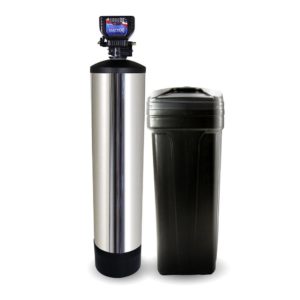
If you’re looking for a more tech-focused water softener, the US Water Systems Matrixx Softener is an interesting system to consider. This system provides a modern, ecologically friendly way to treat hard water with smartphone integration with its smart valve system.
The Matrixx Water Softener has a US Water’s patented Vortech tank system, which provides increased softening and filtering when compared to other systems. It also utilizes a high-capacity resin.
This system’s smart valve technology integrates with your mobile device. The free Waterlogix app provides complete control of the system with a single tap on your phone from a user-friendly dashboard. It connects to your phone through Bluetooth, making it easy to control your system from the palm of your hand.
From the app, you can set the hardness level of your water, track water usage, and monitor the system’s functions.
The Matrixx Softener is available in 7 GPM, 10 GPM, 15 GPM, or 20 GPM variants. Inlet/outlet options are ¾ inch or 1 inch. You can also choose to add a 5-micron Magna filter. The filter can work with either salt or potassium. With a single internal moving part, there is little chance of malfunction or breakdown.
US Water offers a lifetime warranty on the tank and a ten-year warranty on the electronic valve, providing customers with the assurance that the system is sturdy and durable.
The system is low voltage for energy savings and has a battery backup in case of power outages.
US Water also offers an optional 5-micron pre-filter to extend the life of the filtering system as well as household appliances.
The manufacturers of this water softening system estimate that it can save your household up to 40% on water heating costs and up to 50% on cleaning supplies.
It can also increase the longevity of your clothes, cut down the cost of lime removal, protect and extend the life of your appliances, eliminate spots and streaks on your dishes, and result in healthier hair and skin.
- Smart valve tech that integrates with mobile devices
- Battery backup
- Lifetime warranty
- Low voltage
- Low water waste
- Install instructional media is not as helpful as it could be
- The checkout process on the website is glitchy
- Shipping costs are a bit high
4. Quality Water Treatment SoftPro Elite – Best Water Softener for Well Water
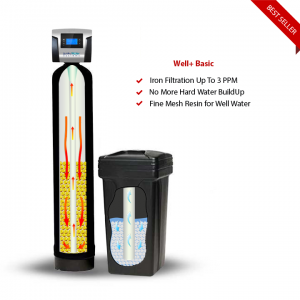
If your water is from a private well , you’ll probably have an issue with hard water. Hard water can cause limescale buildup in your plumbing system and appliances, which can mean costly replacements. Not to mention, hard water isn’t the best tasting or smelling either.
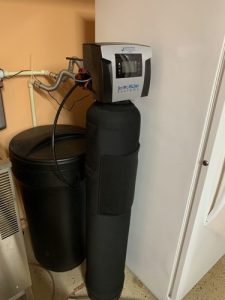
While our top pick (SpringWell FutureSoft®) is great for both city and well water , the SoftPro Elite softener offers some extra features since it was built specifically for private well water.
Quality Water Treatment, owned by “Craig, the water guy,” is a family business from California with 30 years of experience in the water industry. Their best-selling SoftPro Elite Water Softener for Well Water is an efficient softening system and also comes with customized add-on packages that you can add for the best water quality.
The SoftPro Elite basic package includes the SoftPro Well and Basic Control Valve. This system removes 3 PPM of iron, features an upgraded fine mesh resin, a large 18 x 33 brine tank, a user-friendly LCD, and is covered by a Black Neoprene Jacket to protect against hot or cold weather. SoftPro Elite also carries a limited lifetime warranty! This softener has earned a Water Quality Platinum Seal through IAMPO Research and Testing.
The following are additional combination packages:
- SoftProWell + KDF: Removes sulfur and heavy metals, slows bacteria growth
- SoftProWell + PH Buster System: Neutralizes pH levels
- SoftPro Well + Pro Iron System: Filters iron up to 30 PPM, sulfur up to 5 PPM
- SoftPro Well +KDF Buster: Neutralizes pH levels, removes sulfur and heavy metals
- SoftProWell + Ultimate: Neutralizes low pH, removes up to 30 PPM iron
This system is easy to install and comes pre-assembled; however, you may still need to hire a professional if you have no previous plumbing experience.
Review: Quality Water Treatment SoftPro Elite Water Softener
- Package combos meet all water needs
- Water Quality Platinum Seal
- User-friendly LCD display
- Great customer service and support
- Lifetime warranty
- May need to hire a plumber to install
- Some information on this softener is missing from website
5. Aquasana EQ-1000 Water Softener System – Best Full Featured System

For one of the best high-tech water filtration and softening solutions on the market, we recommend checking out the Aquasana EQ-1000. Featuring a patented UV filtration system, the Aquasana is a great choice if you want to combine the benefits of filtration and softening.
As one of the best selling whole house filtration systems, the Aquasana stands out among the rest for its one-million-gallon guarantee. In other words, Aquasana is so confident in the durability of their system, that they guarantee that you will get no fewer than one million gallons of filtration out of the EQ-1000—try getting that from any other popular brand!
The Aquasana is a water softening system unlike any other. For instance, their original design includes a SimplySoft tank that does not require the use of salt or any unnecessary additives.
The SimplySoft hardware can remove 97% of chlorine and other unwanted contaminants in the water supply, which makes the Aquasana a great choice if you are concerned about purity.
With 99.99% of bacteria and potential viruses removed by the SimplySoft formula, you can ensure that the EQ-1000 will protect your family’s health and safety when it comes to drinking water and skin health.
However, no product is perfect. One of our major qualms with this model is that it is larger than most others (77 pounds), is difficult to install, and ships in multiple boxes that may arrive on separate days.
- Its antibacterial filtration system removes 99.99% of harmful bacteria
- Its dual-tank SimplySoft design doesn’t need salt to operate
- The filter is guaranteed to last for up to 10 years or one million gallons
- It does not require chemicals or additional parts to setup
- No draining, backflushing, or water waste is required
- Time-consuming installation process
- Usually ships in separate boxes
- Its large form factor (77 pounds) isn’t suitable for all homes
Conclusion
Although the Aquasana EQ-1000 softener is bulky and a bit cumbersome (because it includes some excellent capabilities!), it is worth the investment if your family’s health and safety is your main concern along with no longer needing to worry about limescale, stains, buildup, and other issues of water hardness. It is designed so that it removes all of the hardness.
While it is not your standard salt-based water softener by any means, it provides all the typical perks of the best designed water softener systems with extra salt-free filtration capabilities to remove harmful contaminants and bring benefits to your appliances, skin, and overall water usage. Read through the reviews on this page and we won’t be surprised if you end up buying this one.
6. Pelican NaturSoft® Water Softener Alternative
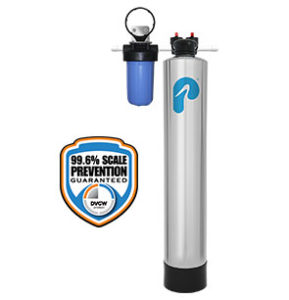
Pentair Pelican’s NaturSoft® Water Softener Alternative doesn’t just soften water: it softens, conditions, and effectively removes 99.6% of scale build-up.
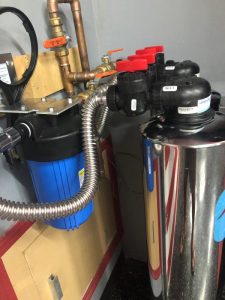
This system is set apart from its competitors in that not only does it not require electricity or salt, but it is also the only third-party tested DW 9191 certified water softener alternative on the market. In addition, the Pelican NaturSoft® Water Softener meets NSF/ANSI 61 and 42 certifications for safe materials and structural integrity.
The Pelican NaturSoft® features a 5-micron Sediment Filter to remove dirt and debris and the Natursoft® media’s calcium carbonate crystal structures to neutralize the chemical composition of mineral elements. This way, they won’t be able to cause scale build-up in your pipes and appliances. In addition, this softener leaves in beneficial minerals, which produces a clean, clear, great-tasting water.
This system will remove hardness up to 75 GPG, which is two times more than the average softener. There is zero water waste with this system, which also sets it apart from its competition. In addition, the Tank Media never needs replacing! You will save money in the long run since you won’t need to be hiring plumbers or replacing appliances from scale build-up.
The Pelican NaturSoft® Water Softener Alternative comes in two models: the NS3 is designed for homes with 1-3 bathrooms, and the NS6 is for 4-6 bathrooms. This comprehensive system features all the parts necessary for a complete installation and includes a limited lifetime warranty on the tank and parts.
Review: Pelican NaturSoft Water Softener
- Certified for 99.6% hard water scale prevention
- Tested and certified to NSF/ANSI standards
- Salt-free technology
- No electricity
- Minimal maintenance
- Limited lifetime warranties
- Does not prevent water spots
- Expensive (but the cost pays off in the future)
7. Eddy Electronic ED6002P – Best Electronic Water Softener

The famous Eddy Electronic ED6002P has gained a reputation in the water softener industry for its reliable 12-month 100% “No Quibble” money-back guarantee.
Under this comprehensive warranty, users also get a lifetime repair and parts replacement protection plan for added peace of mind. With the ED6002P, you get the best warranty coverage in the business—period.
Unlike bulkier water softeners on the market, the ED6002P does not require salt or any other additives to filter water. Instead, the system operates with a minimalist design that is ultra-lightweight at only 1.45 pounds and the dimensions equally small.
In total, the ED6002P (not salt-based) water softening system measures only 6.7 inches on its largest side and only 3.5 inches in width. If you do not believe us, wait until you see how small this device is when the box arrives at your door.
Marketed as a “descaler” system, the ED6002P packs just as much water softening power as any other leading model in the business. Best of all, this device is environmentally friendly thanks to the desalinated filtration system that Eddy Electronic uses without eliminating healthy minerals in the water.
Those who live in a hard water area or somewhere with sulfur-dense well water, it may be a good decision to look into the ED6002P.
This is because the ED6002P can improve the taste and quality of your drinking water without stripping it of the healthy minerals and vitamins that your bodies, plants, and soil need to survive.
- The environmentally friendly design does not damage soil or plants
- Ultra-lightweight build, weighing only 1.45 pounds
- Easy installation process; can be equipped with a plastic or metal piping system
- Industry-leading 12-month “No Quibble” money-back guarantee
- The device prevents limescale buildup and other unwanted stains and residues
- It still leaves traces of calcium buildup around our shower head, so it doesn’t remove all buildup
- It is priced a little bit higher than comparable models
Conclusion
Overall, the ED6002P provides excellent value for your money in an alternative to salt-based water filter systems. If you like to get the most convenient, hassle-free product on the market, the ED6002P is a fantastic choice since it does not require the use of salt, which means no more occasional trips out to the hardware store.
For those who need to conserve space in their homes, the ED6002P simply cannot be beaten.
8. Nuvo H20 DPHB Water Softener
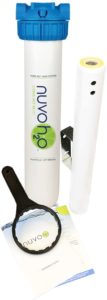
Nuvo H20 DPHB is one of the highest-rated water softener systems on the market, and for a good reason. Using a salt-free alternative to the standard filtration system, the Nuvo H20 instead uses cartridges to filter out all of the unwanted contaminants in your household water supply. The downside, however, is that the salt-free cartridge measures 20 inches in length.
Nonetheless, the Nuvo H20 is one of the best water softener machines if you need a high technology and reliable unit for a small-to-mid-sized household with 1-6 inhabitants. Since this machine does not use salt, you have the benefit of not having to run out to your local hardware store every time you want to replenish your salt supply.
At a capacity of up to 50,000 gallons, the Nuvo H20 can filter the average amount of water that a household of two consumes annually. Therefore, if you have a family of four, it is suggested that you upgrade your filter twice per year. While this may seem like an unwanted chore, it beats going out to buy more salt every couple of months. Installation is also straightforward, so there’s not much of a concern here.
With salt-based soft softeners, you always have to be on guard when it comes to clogs and corrosion in your plumbing system. Luckily, the Nuvo H20 renders that concerns a thing of the past and will remove the bad stuff..
Instead, this system is a good descaler and provides a gentle softening that removes minerals, the lime, chlorine, sulfur, and other messy and potentially dangerous chemicals without getting rid of any of the healthy minerals that your body needs.
- Lightweight 8 lbs. Design
- Listed at a budget-friendly price point
- Boasts an impressive 12-15 GPM
- It does not prevent scale building or lower existing scale
- It does not require the use of salt
- The filter only lasts approximately six months in a four-person household
- Does not soften water to the same extent as other leading models
Conclusion
Ultimately, the Nuvo H20 is a serviceable water softener if you want to soften your water with a compact device at a reasonable price point that is not based on a salt-based design.
However, you can expect this water filter to still deliver an effective level of softening inferior to that of Culligan and other leading brands in the water softening industry.
9. Watts Water M7002
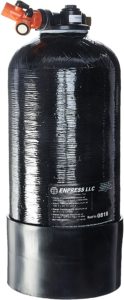
The Watts Water M7002 is one of the few affordable water softeners that does not follow the Fleck 5600 design formula. Instead, the team at Watts Water Technologies has reinvented the whole house water softener system by introducing this all-new system that, though at a larger form factor, provides best-in-class quality.
The M7002 comes with a built-in drain line flow restrictor which makes regeneration more effective and increases flow capacity by up to 55% compared to standard water softeners. In other words, you get more value for your money by choosing the upgraded M7002 system. With a low-pressure drop, you can achieve flow rates as high as 4 GPM with the M7002, which is superior to most other models.
Unlike open-base tanks, the M7002 comes with a full cradle base that keeps the tank stabilized and secured on the ground without having to purchase any additional hardware.
In our books, this makes it a solid investment for long-term use in an RV or in a garage or inside the home. Best of all, you can use regular table salt to supply the tank instead of expensive rock salt for a more price efficient water treatment installation solution.
- A full cradle base keeps the unit upright and secure
- 55% higher regeneration capacity means longer and stronger water supply
- Runs on regular household table salt
- Reaches a maximum flow rate of 4 GPM
- Easier installation than the Fleck line of water softeners
- Is sometimes prone to leaking through valves
- The salt fill hole is small and narrow, making it harder to pour in
Conclusion
The M7002 is a great buy if you need a softener for an RV especially or a small household in a neighborhood that has reasonably hard water. However, we don’t recommend going for this model if you plan to use it in an RV where there is exceptionally hard water such as Mohave County where a solution that is a more capable descaler would be better.
10. Iron Pro 2 Water Softening System
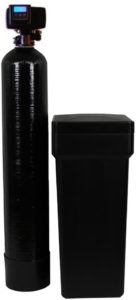
The Iron Pro 2 is an upgraded version of the classic Fleck 5600SXT salt-based water filter designed by the experts at Abundant Flow Water Systems. Boasting a sleek, modern-looking black aesthetic, the Iron Pro 2 is one of the best water softener units regarding its look and feel. Although its 32,000-grain capacity falls short of the 48,000-grain standard, it is still more than capable of servicing a household of two. Those with larger households should seek out higher grain water softening systems.
When it comes to removing water hardness, the Iron Pro 2 lowers hardness levels by up to 75 GPG and lowers iron levels between six and eight PPM. Other additives to water, such as sand, rust, and sediment are also thoroughly cleaned by the elite filtration system in the Iron Pro 2. Also, the five-year manufacturer’s warranty provides extensive coverage on all Iron Pro 2 parts.
Like all Fleck 5600SXT models, the Iron Pro 2 comes with a digital LCD metered valve that makes it easy to measure water hardness and adjust levels accordingly. Plus, all Iron Pro 2 units come bundled with everything you need right in the box, including the brine tank, bypass valve, and various DIY instructions.
Unfortunately, the Iron Pro 2 weighs a hefty 53 pounds, which makes it unsuitable for setup and installation by everyone. To make matters worse, it can be difficult to hook up an Iron Pro system even if you are able-bodied and have a bit of plumbing experience under your belt.
Therefore, it may be a good idea to hire a professional to assist with installation.
- Sleek, attractive jet-black aesthetic
- Offers excellent value for the money
- The perfect size and grain capacity for 1-2 person households (not ideal grain capacity for households of 3+)
- It features bright LCD digital monitor and valve for quick adjustments
- Heavy, 53-lbs. Build makes for difficult installation
- Abundant Flow Water Systems can sometimes offer spotty technical support
Conclusion
The Iron Pro 2 takes an already well-refined water softener and designed it to give it a fresh new look while bulking it up a bit.
While you will inevitably get great value from this water softener in a household of one or two people, you may be better suited for a more compact, higher capacity system if you have a larger family. That’s because the grain count matters and the amount of grains available with this product makes it more suitable for the smallest households.
Water Softener 101: A First-time User Guide
We’ve gathered together a good collection of useful information that will help you to get educated and make the right buying decision.
As you read through this guide, we’ll discuss usage of soft water systems, grain capacities, what scale is and how a system removes it, the effect of hard water on appliances, skin, hair, and softening helps all of the above.
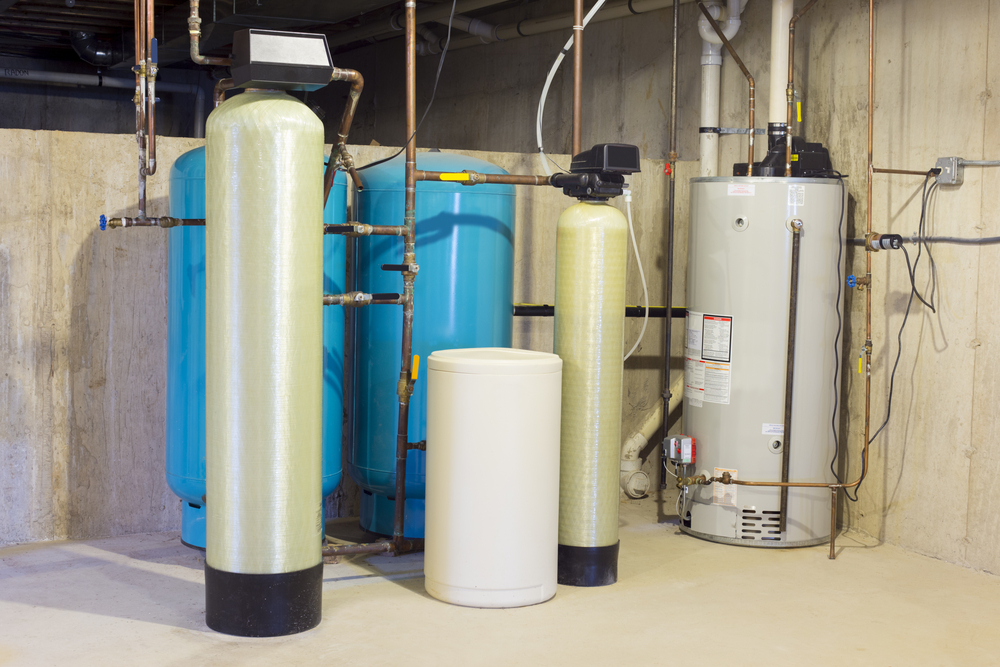
The Issue: Hard Water
Hard water may seem like a foreign concept. After all, isn’t water soft? It certainly seems that way, so what does “hard water” mean?
Hard water refers to water that contains large amounts of dissolved minerals, specifically calcium and magnesium. While these minerals are pretty much undetectable through smell or taste and they don’t make the water dangerous to drink, they still can produce some unpleasant effects.
The effects of elevated mineral levels range from aggravating to damaging. The effects of hard water cause cloudy water spots on sinks, showers, dishes, and more. Your coffee pot may form crusty, white deposits that are hard to remove. Pretty disgusting, right?
That’s not all. Showering in hard water dries out your skin and may even leave it your skin feeling itchy since it is hard to lather up and rinse thoroughly with hard water. The same things also apply to your hair. Washing clothes leaves them faded and worn, even if they are new. These are aggravating effects of hard water, but by no means hugely problematic.
However, there are issues with hard water that can be hugely problematic.
Then there’s cost associated with hard water. For example, hard water can shorten the lifespan of your hot water heater. An average hot water heater lasts 8-10 years, but hard water can shorten its life to as few as 4-6 years.
Hard water can also shorten the lifespan of other appliances such as your washing machine or toilet. As water runs through pipes and then out faucets and hoses in the shower, sink, washing machine, water heater, and dishwasher, it’s leaving behind hard mineral deposits. Initially, these deposits are harmless, but after a while, they build up and that buildup will clog up your pipes, restrict water flow, and potentially damage the whole plumbing system.
See our guide on hard vs soft water comparison.
Find Your Hard Water Level
85% of American homes have hard water, so it is a common issue. Water hardness is measured in GPG (grains per gallon), and it is predominately found in the southern states and throughout the Midwest.
You can find out your water hardness level by contacting your municipality if you have city water or by using a water hardness kit. The following are the levels of hard water:
- Slightly hard water: 0-3 GPG
- Moderately hard water: 3-7 GPG
- Hard water: 7-10 GPG
- Very hard water: 10-14 GPG
- Extremely hard water: over 14 GPG
Hard water is a common and potentially destructive problem. Thankfully, there’s an effective, simple solution: install a water softener.
What is a Water Softener?
Water softeners operate on a simple principle: calcium and magnesium ions in water switch places with less damaging ions, usually sodium. The exchange eliminates the problems that come with hard water because sodium doesn’t clog up pipes or react badly with soap.
Water softeners come in a variety of sizes and styles to accommodate your household size. A typical type of water softener is designed with a tall, narrow, water-softener tank and a short, wide brine tank. The softener is connected to the home’s water supply line, which means it will typically be installed in the garage, basement, or utility closet.
Here’s how it works: After the softener tank is connected to the water supply line, a small-diameter fill tube connects the brine tank to the softener tank. A discharge hose then runs from the softener tank to a drainpipe or dry-well. The softener tank is filled with resin beads, which are sealed inside the tank. The brine tank is then filled with salt or potassium chloride pellets.
Water flows through the top of the water-softener tank and then percolates through the resin beads. The resin has a negative charge, which attracts the positively charged minerals in the water. This process is called ion exchange. The mineral deposits cling to the resin, and the softened water exits the tank and streams throughout the pipes.
Everything is working nicely; the water is soft for a while. Then, the beads reach maximum capacity and can’t attract any more mineral ions. When this occurs, the softener tank must be regenerated or flushed clean.
Water softeners can be regenerated in three ways: by meter, on a timer, or manually.
Meter regeneration functions using an on-board computer that calculates the amount of water that flows through the softener. When it reaches the pre-programmed setting, regeneration automatically begins. For example, an average three-bedroom house with a family of four’s water softener would begin to regenerate after about 12,000 gallons.
Timer regeneration works by regenerating on a set schedule, for example, once a week. Manual regeneration works when the user goes in and regenerates the softener whenever it is needed.
During the regeneration process, salty water from the brine tank flows up the fill tube and into the softener tank. A rinse cycle begins, and the salty water washes the mineral deposits out of the discharge hose. Around once a month, salt or potassium chloride pellets should be added to the brine tank. An average family of four typically needs to add 50 pounds of pellets each month.
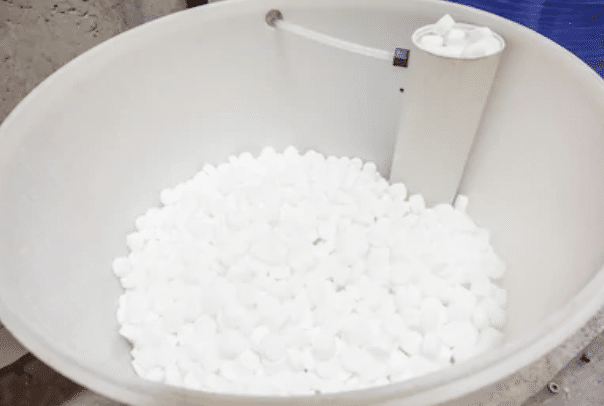
Types of Water Softeners
There are several different types of water softeners on the market today, but before you even begin to compare brands, you should know what type of system you need. Here are a few common types:
Ion Exchange
Most water softeners use the same method: the ion exchange. The ion exchange method “exchanges” ions in a water supply by substituting sodium ions for magnesium, calcium, iron, and other hard minerals.
Reverse Osmosis
Reverse osmosis water softeners remove contaminants and dissolved minerals in your water by forcing them through a filter. These systems are more environmentally friendly than other types because they don’t use any chemicals.
Magnetic (“Descaler”)
Magnetic softeners, also known as Descalers, use magnets in or around water pipes so that the magnets will purify the water. Even though the magnetic water softener is called such, it is technically not a water softener since it does not produce soft water. Instead, it conditions your water as it passes through a magnetic field. Minerals will not stick to your pipes, so this system will prevent them from clogging up.
The downside to these systems is that water will return to a hard state within 48 hours after leaving the magnetic field.
Salt-free
Salt-free water softeners use a potassium-chloride salt substitute rather than sodium. Salt-free softeners don’t reduce the hard minerals in your water, but they do prevent them from building up in pipes and appliances. Those who are concerned about their sodium intake may prefer these types of softeners that remove salt from the process.
Whole House vs Point of Use
A whole house water softener is a large appliance that treats your entire home’s water supply. A point-of-use system is a water softener that treats water only where it’s used, for example, the dishwasher or shower. As you can imagine, whole house water softening systems feature less maintenance simply by virtue of less systems to maintain.
See our recent article on water softener alternatives.
Other Features
In addition to different types of water softeners, there are also special features that should be considered.
Dual-tank water softeners are ion-exchange models that contain two resin tanks so that one is always available for use if the other is in the regeneration cycle. The two tanks ensure that the household can access soft water at any time.
Time controls can recharge the machine at a set time of day. Using time controls is most effective if you consistently use the same amount of water every day.
Demand-initiated regeneration (DIR) detects when the resign needs to be recharged. This is a more sophisticated method and is more efficient than time controls.
Then, of course, there’s the size of the water softener. They take up space, so make sure you have the space allotted for the machine before you buy it. There are portable water softeners, which are smaller, but they are unable to handle a larger capacity of a family home.
How to Install a Water Softener
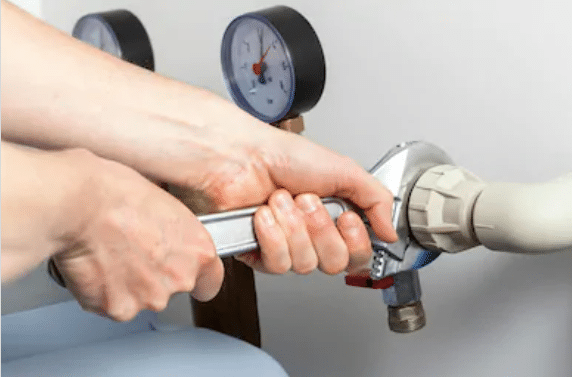
In most cases, the company you purchase your unit from will be able to install it for you; in fact, you may even get a package deal on the installation. This makes it simple and easy. If this is not an option, depending on the size and complexity of the water softener, you may want to hire a professional to install it. This will ensure that it is done correctly and efficiently.
However, if you would rather do it yourself, every water softener system comes with its own set of instructions, so these should be followed carefully.
Of the four types of water softeners, magnetic systems are the easiest to install. Reverse osmosis systems aren’t difficult either, but the difficulty may vary depending on the size you get.
Smaller filters will require you to install some compression nuts on the pipes, but larger ones may require soldering of the pipes, which can get messy and complicated (but can be done!)
Whole-house water systems need to be installed as close as possible where water enters your house. In most homes, water softeners are installed in the basement or in a utility closet near the water heater.
For ion exchange water softeners, first, check with your local town hall to make sure that you are in compliance with building codes. Some codes require that a bypass or shut off valve be installed with the unit.
Basic tools and materials include:
- Tape measure
- Pipe cutters
- Pipe wrench
- Tee valves
- Gate valves
- Compression fittings
- Tubing or copper pipe
- Flexible tubing
- PVC solvent
- Teflon tape
- Torch and solder
Here are the basic steps to install an ion exchange water softener. Remember though, the instructions for your specific water softener should be followed to ensure it is installed correctly and will work effectively:
- First, shut off the water at your house at the mainline and drain your pipes
- Shut off your hot water heater and turn off the power
- Locate the area along the mainline where you want to install the water softener
- Cut into the mainline using a pipe cutter. Tighten the cutter onto the pipe, then rotate it around until the pipe is cut through
- Install an elbow fitting in the line
- Measure the pipes that lead to the bypass valve by taking measurements from the unit.
- Cut the pipes to fit, and solder fittings before you connect the pipe to the bypass valve
- Attach the pipes to the unit using the compression fittings
- Securely clamp the hose to the unit, and feed it to where it will drain. The end of the hose should be at least two inches above the drain hole to prevent back siphoning of water
- Connect the overflow tube to the brine tank (the instructions should give you the height and placement)
- Turn the valve to the bypass position and flush water through it to remove any debris
- Plug in the unit, and set the valve to the backwash position.
- Then, open the valve slowly to let water in while releasing any air in the pipes.
If you have a salt-free system, again, use the package as a guide on how to install it. Here are the tools involved:
- Pipe cutters
- Pipe wrench
- Compression fittings
- Teflon tape
- Tubing or copper pipe
The directions for installing a salt-free system are similar to installing an ion exchange system:
- First, choose where you will install the water softener
- Shut off the main water, and drain the water from the pipes
- Make a cut into the pipe on the cold water supply by rotating it around the pipe
- Attach a shut-off valve to the pipe, by gluing it to the PVC or by soldering it to copper
- Install the carbon pre-filter after the shut-off valve, attaching it using the compression fittings
- Install a second shut-off valve after the pre-filter
- Extend the pipe to the head of the filter system and attach it with a compression fitting
- Connect the down-flow outlet of the system back to cold water supply pipe
- Close both shut-off valves and turn on the main water valve for the house
The benefits of a water softener are well worth the cost of one. You will enjoy natural, clean drinking water, brighter laundry, cleaner dishes, longer-lasting appliances, and fewer clogs. Maintenance has also been improved greatly in recent years and there are different types of water softening systems that have inherently less maintenance needs.
Conclusion
Ultimately, the best softener system is one that meets your household’s specific demands and will remove buildup, contaminants, hardness, chlorine, and other issues from your water . If you lack plumbing skills and don’t want to fiddle with inlet ¾-inch NTP hose adapters, you might want to invest in a simpler, pre-assembled system such as those made by Eddy Electronic or Nuvo.
However, those interested in stretching their money as far as it can go should consider purchasing a more sophisticated whole house water softener.
In which case, we recommend taking the time to install a SpringWell softener.
Related Water Softener Guides:

